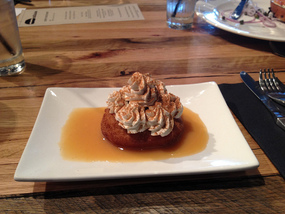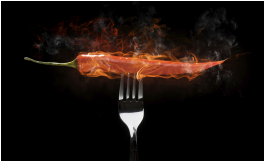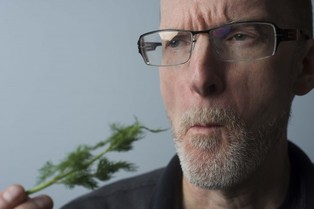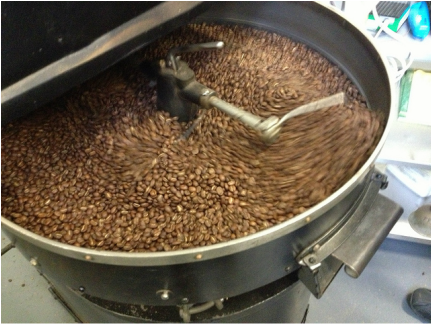PRAISE FOR TASTY
 Umami donut, Umami Burger, Los Angeles.
Umami donut, Umami Burger, Los Angeles.
"[A] fascinating blend of culinary history and the science of taste ... he sets the stage for an eagerly anticipated second helping."
– Publishers Weekly (starred review)
John McQuaid "mixes science, literature, history, and anecdote in the service of his stellar inquiry into the inner workings of taste ... a 'secret world lying just under the surface of everyday experience.'"
– Elle
“McQuaid unpacks with appealing gusto the reasons for the wide variety of human reactions to taste ... Tasty offers a full meal.”
– Booklist
“[A] provocative investigatory foray into the nature of taste … McQuaid is an enthusiastic writer undisturbed by dead ends, and he provides an entertaining exploration of 'the mystery at the heart of flavor,' which 'has never truly been cracked.'"
– Kirkus Reviews
“Early on in this excellent and absorbing investigation into the origin and nature of taste, John McQuaid promises that the book will be “a brief biography of flavor … If I imagined a whiff of hubris in McQuaid’s ambitions, the Pulitzer Prize-winning journalist certainly proved himself up to the task, distilling and presenting in lively and entertaining prose a dizzying amount of scientific and cultural research throughout…"
– Boston Globe
“An exploration of taste in all its complexity and contradiction … McQuaid is a deft writer with a talent for vivid metaphors.”
–Businessweek
"I struggled to decide at a few points whether I was more awed by the science that McQuaid so ably describes or terrified for the future of humankind."
– Globe and Mail
"Explores how deliberate manipulation of flavor influences virtually every aspect of the human experience, from pleasure to pain, from joy to sorrow. This is an awe-inspiring, landmark book."
– David Perlmutter, MD, author of the #1 New York Times bestseller Grain Brain: The Surprising Truth Abut Wheat, Carbs and Sugar – Your Brain's Silent Killers
"A delightful and eye-opening romp through the evolutionary story of one of the least understood drivers of human behavior. Taste has defined our migration across continents and propelled us to set sail for foreign lands. ... John McQuaid packs this ripe and succulent account with one revealing detail after another, leaving readers with a greater understanding of what it means to be human."
– Melanie Warner, author of Pandora's Lunchbox: How Processed Food Took Over the American Meal
"Our tastes evolved to help us: delicious food nourishes us and makes us healthy. John McQuaid, in teaching us about taste, engagingly shows how our food can be more pleasing and our lives more healthful. The only thing better than a delicious meal is a delicious meal after reading Tasty!"
– Paul Jaminet, PhD, coauthor of Perfect Health Diet: Regain Health and Lose Weight by Eating the way You Were Meant to Eat
– Publishers Weekly (starred review)
John McQuaid "mixes science, literature, history, and anecdote in the service of his stellar inquiry into the inner workings of taste ... a 'secret world lying just under the surface of everyday experience.'"
– Elle
“McQuaid unpacks with appealing gusto the reasons for the wide variety of human reactions to taste ... Tasty offers a full meal.”
– Booklist
“[A] provocative investigatory foray into the nature of taste … McQuaid is an enthusiastic writer undisturbed by dead ends, and he provides an entertaining exploration of 'the mystery at the heart of flavor,' which 'has never truly been cracked.'"
– Kirkus Reviews
“Early on in this excellent and absorbing investigation into the origin and nature of taste, John McQuaid promises that the book will be “a brief biography of flavor … If I imagined a whiff of hubris in McQuaid’s ambitions, the Pulitzer Prize-winning journalist certainly proved himself up to the task, distilling and presenting in lively and entertaining prose a dizzying amount of scientific and cultural research throughout…"
– Boston Globe
“An exploration of taste in all its complexity and contradiction … McQuaid is a deft writer with a talent for vivid metaphors.”
–Businessweek
"I struggled to decide at a few points whether I was more awed by the science that McQuaid so ably describes or terrified for the future of humankind."
– Globe and Mail
"Explores how deliberate manipulation of flavor influences virtually every aspect of the human experience, from pleasure to pain, from joy to sorrow. This is an awe-inspiring, landmark book."
– David Perlmutter, MD, author of the #1 New York Times bestseller Grain Brain: The Surprising Truth Abut Wheat, Carbs and Sugar – Your Brain's Silent Killers
"A delightful and eye-opening romp through the evolutionary story of one of the least understood drivers of human behavior. Taste has defined our migration across continents and propelled us to set sail for foreign lands. ... John McQuaid packs this ripe and succulent account with one revealing detail after another, leaving readers with a greater understanding of what it means to be human."
– Melanie Warner, author of Pandora's Lunchbox: How Processed Food Took Over the American Meal
"Our tastes evolved to help us: delicious food nourishes us and makes us healthy. John McQuaid, in teaching us about taste, engagingly shows how our food can be more pleasing and our lives more healthful. The only thing better than a delicious meal is a delicious meal after reading Tasty!"
– Paul Jaminet, PhD, coauthor of Perfect Health Diet: Regain Health and Lose Weight by Eating the way You Were Meant to Eat
EXCERPTS

The Wall Street Journal
Why We Love the Pain of Spicy Food
"[T]he chili sensation isn’t just warm: It hurts! It is a form of pain and irritation. There’s no obvious biological reason why humans should tolerate it, let alone seek it out and enjoy it. For centuries, humans have eagerly consumed capsaicin—the molecule that generates the heat sensation—even though nature seems to have created it to repel us."
The Atlantic
The First Potato Chip: A very short book excerpt
"The potato chip is an American invention. Its exact origins are cloudy; the most famous story suggests it was born at the Moon Lake Lodge in Saratoga Springs, New York, in 1853, when a diner found his side dish of fried potatoes soggy ... "
National Post
Getting bitter: Tasty, The Art and Science of What We Eat traces the evolution of flavour in human cultures
"Some forms of bitter sensitivity clearly enhance the odds of survival. But insensitivity does too. It must have some uses, or it would not be around today. What are they? Bitterness seems to serve as something more than a mere toxic substance alarm."
Salon.com
The mysteries of chili heat: Why people love the pain
"Chili heat is painful, yet enjoyable; fiery, with no rise in temperature. In 1953, T. S. Lee, a biologist at the National University of Singapore, tried to unravel the physiology behind this reaction. He asked a group of forty-six young men to eat chilies, and monitored their sweating ... Lee had the volunteers dress in cotton trousers only, then painted their faces, ears, necks, and upper bodies with a solution of iodine and dusted them with dry cornstarch—a combination that makes sweat turn blue. Lee used peppers common in Asian cuisine, from the species Capsicum annuum. Their tapered red fruits are about ten to twenty times hotter than Jalapeños."
Why We Love the Pain of Spicy Food
"[T]he chili sensation isn’t just warm: It hurts! It is a form of pain and irritation. There’s no obvious biological reason why humans should tolerate it, let alone seek it out and enjoy it. For centuries, humans have eagerly consumed capsaicin—the molecule that generates the heat sensation—even though nature seems to have created it to repel us."
The Atlantic
The First Potato Chip: A very short book excerpt
"The potato chip is an American invention. Its exact origins are cloudy; the most famous story suggests it was born at the Moon Lake Lodge in Saratoga Springs, New York, in 1853, when a diner found his side dish of fried potatoes soggy ... "
National Post
Getting bitter: Tasty, The Art and Science of What We Eat traces the evolution of flavour in human cultures
"Some forms of bitter sensitivity clearly enhance the odds of survival. But insensitivity does too. It must have some uses, or it would not be around today. What are they? Bitterness seems to serve as something more than a mere toxic substance alarm."
Salon.com
The mysteries of chili heat: Why people love the pain
"Chili heat is painful, yet enjoyable; fiery, with no rise in temperature. In 1953, T. S. Lee, a biologist at the National University of Singapore, tried to unravel the physiology behind this reaction. He asked a group of forty-six young men to eat chilies, and monitored their sweating ... Lee had the volunteers dress in cotton trousers only, then painted their faces, ears, necks, and upper bodies with a solution of iodine and dusted them with dry cornstarch—a combination that makes sweat turn blue. Lee used peppers common in Asian cuisine, from the species Capsicum annuum. Their tapered red fruits are about ten to twenty times hotter than Jalapeños."
MEDIA
 Washington Post photo
Washington Post photo
NPR Weekend Edition Sunday: 'Tasty': How Flavor Helped Make Us Human
Scientific American: How the Sense of Taste has Shaped Who We Are
National Geographic: From Campfire to Haute Cuisine: How Food and Flavor Drove Human Evolution
Slate.com:
Why Do We Like Bitter Foods?
Secret Sauce: Umami is what makes savory foods so delicious
The Science of Mmm: How food and drink tickle the brain’s pleasure centers
Globe and Mail: Unlocking taste: Desire, disgust, and why it’s okay to hate Brussels sprouts
Washington Post: Accounting for Taste
NPR's On Point, interview with Tom Ashbrook: The Surprising Science Behind Your Favorite Flavors
WHYY Radio Times, interview with Marty Moss-Coane: All about taste and flavors with writer John McQuaid
Book Q&As with Deborah Kalb: John McQuaid
Scientific American: How the Sense of Taste has Shaped Who We Are
National Geographic: From Campfire to Haute Cuisine: How Food and Flavor Drove Human Evolution
Slate.com:
Why Do We Like Bitter Foods?
Secret Sauce: Umami is what makes savory foods so delicious
The Science of Mmm: How food and drink tickle the brain’s pleasure centers
Globe and Mail: Unlocking taste: Desire, disgust, and why it’s okay to hate Brussels sprouts
Washington Post: Accounting for Taste
NPR's On Point, interview with Tom Ashbrook: The Surprising Science Behind Your Favorite Flavors
WHYY Radio Times, interview with Marty Moss-Coane: All about taste and flavors with writer John McQuaid
Book Q&As with Deborah Kalb: John McQuaid
EVENTSJanuary 13, 2015: Publication Day!
January 13, 2015, 7 p.m. Politics & Prose, Washington, D.C. January 21, 2015, 12:30 p.m. Book Passage, San Francisco January 21, 2015, 7:30 p.m. Kepler's Books, San Francisco May 20, 2015, 6:30 p.m. Mid-Manhattan Public Library June 2015 Ideacity, Toronto |
